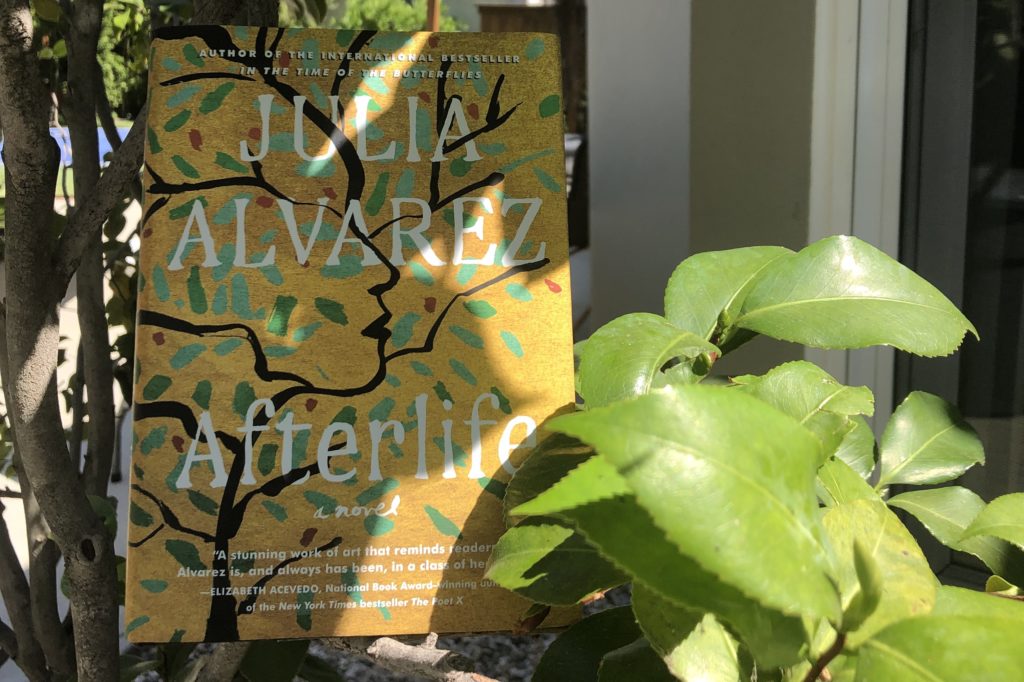Afterlife crept up on me. It’s brief, small to hold, a quick 256 pages. While reading it, I thought it was about one woman’s loss of her husband. Only afterward did I realize that this novel also explores the daily losses we feel when we strive to live up to our ideals for ourselves and those we love.
On the first two pages, Antonia Vega, second sister of a Dominican sisterhood of four, living in a Vermont full of neighbors and migrant workers, drives to meet her husband for a dinner to celebrate her retirement – only to find that he never arrives, his car in a ditch, his life stopped in his early seventies.
In a moment, Antonia has lost not only Sam but her career as an English professor and the life she thought she would have in retirement, centered in a house Sam built for her. She spends the rest of the book navigating what these multiple losses mean, in conversation with the local sheriff, the farmer down the street housing undocumented migrant workers, her bipolar sister pulling a trailer of llamas. As with any Julia Alvarez novel, for children or adults, the territory is rich with questions of ethics and immigration and soul.
Antonia tries to cope, wondering midway through, “What, if anything, does it mean? An afterlife? All she has come up with is that the only way not to let the people she loves die forever is to embody what she loved about them. Otherwise the world is indeed depleted.” And so she tries to embody Sam’s generosity of spirit, his perennial suggestion to “Let’s see what love can do.” She tries to seize her sister Izzy’s often reckless spontaneity, making decisions in haste, de repente – this book made me think in Spanish here and there.
It also made me think in English, inspired by the professor Antonia is – and the novel is so vivid I can imagine being in her class, which I imagined as slightly didactic but mostly soaring. Fragments of poems, some I recognized, many I had to look up, stutter and flow throughout. Antonia relates Matthew Arnold’s “wandering between two worlds” to families longing for asylum at the border, and T.S. Eliot’s “So here I am, in the middle way” to her own “slow bleed of chronic grieving.” We hear about the “exquisite delicate ship” from “Musee de Beaux Arts,” a phrase I had never noticed from a poem I’ve read a hundred times. For Antonia, Auden’s poem about the ubiquity of suffering helps “keep confusion at bay,” a line that reminded me of Robert Frost’s observation that poetry is “a momentary stay against confusion.” My own mother, also an English teacher, like to quote this to me when times were uncertain.
For Antonia, though, poetry is no longer always a panacea. Sometimes, as when Wallace Stevens’ “After the final no there comes a yes –” rattles in her brain, Antonio tells the poet simply to “Shut up!” Sometimes even words are not enough, even though “[l]anguage used to be good at stanching the flow.”
You can read this book without glossing any of the quotes, rather by just living through the memorable characters who stumble alone and toward each other. But by the end I was in the mood to take one more line to heart, Rainer Maria Rilke’s famous “You must change your life.” This quote, like Afterlife as a whole, reminds us to fully inhabit the imperfect spaces we create individually and then try to connect through love, halting and imperfect as it may be.

